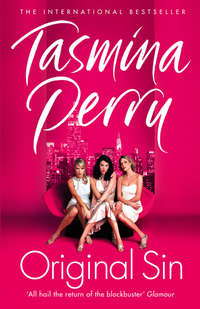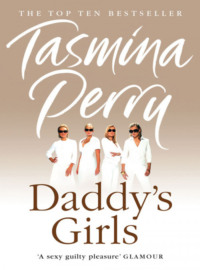
Полная версия
Gold Diggers
She picked on a crab claw before throwing it into a plant pot behind her. She took a deep breath, assuring herself that the situation was purely temporary. She was Molly Sinclair, the supermodel. She had lived longer on her wits than any of these nobodies. She stalked off to the bathroom to take a line of cocaine. She’d show them. All of them.
Karin popped open her compact and checked her reflection. She had to be looking her best for a charm offensive. As godmother, Karin’s attendance at Evie’s christening had, of course, been de rigueur, but it was also an ideal opportunity to drum up business for the charity benefit gala dinner she had planned for the following month. With so many society players in the room in such a buoyant, benevolent mood, it would have been foolish to let the opportunity pass to sell tickets for her ‘Stop Global Warming’ benefit gala. Like many of the women in the room, Karin had dipped her toe in charity work before, but after Sebastian’s death she had needed a more substantial project to sink her teeth into, and an exclusive high-profile dinner for eight hundred was just the solution.
‘How are the auction prizes coming along?’ asked Christina, who had already donated a week on the Levys’ yacht the Big Blue as a lot.
‘Fine,’ replied Karin. ‘Except I had to fire the events assistant yesterday. You don’t know anyone suitable, do you? I need someone young, keen, presentable – someone with a brain.’
Christina shook her head blankly.
‘I can ask Martin if you like,’ said Diana. ‘I think his company use some agency.’
‘I’d be grateful,’ said Karin, in her usual cool, efficient manner. ‘They don’t have to be experienced, just keen. I’ll be handling the important matters like guest lists and table plans.’
‘Ahh, I see,’ smiled Diana, playing with a pebble-sized solitaire diamond dangling around her neck. ‘Now you’re single …’
‘Don’t be ridiculous,’ said Karin, waving a hand dismissively. ‘I’m only interested in raising as much money as possible. Do you know what’s happening to the icecaps?’
‘Of course I do,’ said Diana. ‘The snow was awful in Megève this year.’
‘Hey, why don’t we ask Molly Sinclair?’ said Donna, nodding towards the tall woman across the room. ‘She’s a consultant at Feldman Jones PR and Events. She must know someone suitable.’
‘If we must,’ said Karin coolly. Karin barely knew Molly, but knew of her; an eighties almost-supermodel, a coked-up has-been, still on the circuit peddling her overt sexuality, trying to bag whatever half-rich man would have her.
Donna waved her friend over.
‘Everyone here knows Molly, don’t they?’ said Donna, getting weak smiles from all three women. ‘Do you know of any good PAs or events assistants, Molly?’
‘What’s it for?’ purred Molly in her smouldering smoker’s voice.
‘Karin’s Stop Global Warming benefit. She’s trying to do it without a committee,’ said Christina sternly.
Karin smiled thinly. A committee was the last thing she needed. She was happy to let a handful of select, connected friends sell tickets on the fund’s behalf, but the controlling streak in Karin would not allow any meddling in her vision. She wanted the glory to be all hers.
‘Will you be coming, Molly?’ asked Diana, absently wondering how Molly managed to look so good. If she’d had a lift, it was amazing.
‘Tables are very expensive,’ said Karin quickly. ‘One thousand pounds a plate and selling out quickly.’
Molly shook her head, hair swooshing from side to side across her shoulders. ‘Can’t make the actual dinner, unfortunately. I have friends coming from the States that night,’ she said, accepting another glass of champagne from a waiter.
Inwardly, Molly was wincing at the ticket price. A thousand pounds! It was outrageous! Her coke allowance for a month. Six months’ gym membership. A good dress. She knew the event was a worthwhile investment, but she just didn’t have that much money sloshing around.
‘Speaking of friends, I tell you who you should invite,’ smiled Christina, taking a delicate sip of a white Russian. ‘Adam Gold.’
‘Who’s he?’ asked Karin.
‘Karin, darling, you’re slacking,’ smiled Christina through glossy lips. ‘New York real-estate and investment guy. He’s behind some of those fabulous new condo developments in Manhattan, Miami and Dallas. He’s also very sexy and very wealthy. Just made the Forbes list this year.’
Molly’s ears pricked up. Forbes list! That meant net worth a billion dollars minimum.
Karin gave Christina her best uninterested ice-queen expression. ‘Billionaire or not, he’s unlikely to come from New York for a party, even this one.’
‘Oh no, haven’t you heard?’ said Diana, widening her baby-blue eyes. ‘He’s just moved to London. Martin says he’s rolling out his property developing all over Europe, Moscow and Dubai and the Far East.’
‘We could do with a shot of new blood,’ said Christina, smiling. ‘Not that I want to touch, of course,’ she added, stealing a glance at her husband, who was smoking a Cohiba on the terrace, ‘but I do like to look.’
‘Darling, get him invited,’ smiled Christina, touching Karin’s knee meaningfully. ‘The tickets will fly out the door once word gets out that he’s coming.’
‘Well, I am in London that evening,’ said Molly slowly. ‘Perhaps I could pop by afterwards …?’
Karin and Molly’s eyes locked and they recognized in the other something they had encountered many times before. Rivalry.
‘I hate to disappoint you, sweetheart,’ said Karin coolly, ‘but there won’t be any after-dinner tickets for the benefit night. It’s just not that kind of event.’
Molly smiled. It was her sweetest, most earnest smile, a smile that had lit up a dozen magazine covers and persuaded many people, people much richer and more powerful than Karin, to do her bidding. Yes, thought Molly, Adam Gold sounded like just the sort of man to get her right back where she belonged, and she wasn’t going to let an uptight, jealous little control freak like Karin Cavendish stop her from getting him. And her smile grew just a little wider.
2
Cornwall in January is beautiful. Not the hazy beauty of midsummer, when the sea shines turquoise and the sun blurs distant hillsides into deep green smudges, but a bleak, eerie beauty so strong, crisp and immediate that it turns your cheeks pink and sends a shiver through your bones. Erin Devereux pulled her scarf a little higher around her chin, too wound up to appreciate the chilly splendour around her. My life is going nowhere, she thought grimly, thrusting her hands deeper into her pockets and marching on along the cliff top. Usually, whenever she felt uninspired, there was nothing like the granite rocks, crashing surf and the whiff of smugglers to get her creative juices flowing. But nowadays, more often than not, she found herself wondering what she was doing in the prime of her life – well, at twenty-four – living in a tiny village at the end of the earth, trying to write a book about … well, nothing very much at the moment. Erin felt so hemmed in by all this open space, she couldn’t get off the first page. She kicked at a pebble in frustration, missing by inches and stubbing her toe on a tree root. She howled in pain and irritation. Just then, as if someone had turned on a tap, it began to rain hard. Story of my life, thought Erin, and began to run for home.
‘These boots are going straight in the bin,’ declared Erin, pushing open the back door of Hawthorn Cottage and feeling the blast of warm, sweet air on her face. She flopped down on the nearest chair, pulled off her sheepskin boots and threw them in the corner.
‘Got writer’s block again?’ said the elderly woman standing in front of a scarlet Aga. Jilly Thomas, Erin’s grandmother, was as small as a mouse, with a shock of wiry grey hair and a proud, handsome face. There was a line of flour across her lined cheek and she was wearing a navy apron smeared with something white.
‘Yep, writer’s block, writer’s clog, writer’s jam, the lot,’ said Erin, pressing her cold toes against a lukewarm radiator.
‘Well, don’t you worry, lovey,’ said Jilly, ‘I’ve cooked you a nice chicken pie and some mash, too – just the ticket to warm you up.’
Erin smiled at her grandmother. No wonder she had put on seven pounds since she’d been back in Cornwall. But her tall frame could take a little extra weight, hidden most of the time in jeans and a thick sweater. Erin glanced in the mirror above the fireplace and saw a ruddy, pretty farm girl. Her lips were full and naturally pink and long russet curls fell down her back. She’d always envied redheads who had startling green eyes – the classic Irish colouring that gave them bold, cat-like strikingness, but Erin’s eyes were cognac brown and it softened the look. Although right now her cheeks had been stung pink by the sea air and ribbons of wind-lashed hair were still stuck to her face. The glamorous authoress, she thought. Erin wrapped her cold fingers around a steaming mug that Jilly had placed before her.
‘The problem is that there’s nothing to write about round here,’ she complained.
‘You make it sound like it’s Cornwall’s fault,’ said Jilly with a hint of a smile.
‘Well – it is!’ said Erin. ‘I’m not doing anything. I’m not experiencing anything. What am I supposed to write about? Seagulls?’
Erin saw a look of sadness pass over Jilly’s face and felt an immediate stab of guilt. She hadn’t meant to sound so critical of the warm, welcoming village she had called home for the last twenty years, nor did she want Jilly to feel in any way inadequate. She owed her grandmother everything. Erin’s father Phillip had committed suicide when she was five, and her mother Hillary had disappeared twelve months later. Erin had immediately moved in with Jilly Thomas, her maternal grandmother and had been brought up as her own daughter. And she had had an idyllic childhood in Port Merryn, running along the beaches, playing in the narrow, twisty streets. It had been like one long summer holiday; even the winters were cosy and warm in Jilly’s kitchen. But, like much of Cornwall, Port Merryn was a dying community. The Atlantic was all but fished out, removing the village’s traditional income, so the quaint stone fishermen’s cottages circling the harbour were being snapped up by rich Londoners as holiday homes. With property prices soaring and no prospect of work, the families had moved to the cities, leaving only a retired community and a handful of locals running tourist-trap cafés and fudge shops. It had been five years since you had been able to buy a pint of milk in Port Merryn, and in the dead of winter the village was like a ghost town.
‘I’m sorry, gran, I didn’t mean to make it sound like I wanted to leave …’
‘Now, now, lovey,’ said Jilly, wiping her hands on her apron and reaching over to touch Erin’s hand. ‘You’re only saying the truth. I know you love the village, but it’s no place for a young girl, not when you’ve seen what’s on the other side of the hill.’
Erin nodded with melancholy. It had seemed like a good idea to move back to Port Merryn after she had graduated from university six months ago. She could save on rent, and move to the city when she’d made a proper start on her writing career. At least, that had been the plan, but it hadn’t quite worked out that way. Raised on a diet of Daphne Du Maurier and John Fowles – Jilly had always made sure the house was full of books to enrich and inspire her granddaughter’s mind – Erin’s one ambition had been to write the Great British Novel, and had spent every spare moment of her time at uni crafting her debut book. By the end of the last term it had been ready: 120,000 words, double spaced and printed on one-sided white paper. She sent it to a dozen agencies and waited. She had almost given up hope when she had been summoned by Ed Davies, senior partner in Davies & Sisman Literary Agency, to his office in London. Almost numb with excitement, Erin had spent three days deciding what to wear in order to give the right balance of ‘literary genius’ and ‘commercial winner’ and had spent the whole journey there planning her Man Booker Prize acceptance speech. She had thus been badly deflated when Ed Davies had sat her down in his Holborn office and spent twenty minutes telling her why he thought her novel sucked. However, he had seen enough promise, he said, that he was prepared to represent her.
‘I’m taking a chance on you,’ the agent had told her, ‘and this book certainly isn’t going to be your debut novel. But if you can come up with the right premise and execute it as well as I think you can, then I want to be the one negotiating your first deal.’
Erin looked across at her battered old laptop sitting at the desk by the window, almost buried under a mound of papers and notebooks. The screen blinked at her, an open document white and empty. The novel, her great escape route from the village, just wouldn’t come, however hard she tried.
‘Someone called for you while you were out,’ said Jilly, waving an oven glove towards the phone. She was removing a thick crusted pie from the oven, which she placed on the gingham tablecloth.
‘Who was it?’ asked Erin, picking up a Post-it note scrawled with illegible writing. ‘Richard?’ Her relationship with her boyfriend at university was still limping along, even though Erin was now back in Cornwall and Richard was based in London.
‘No, lovey,’ smiled Jilly sympathetically. ‘Katherine someone from an agency, I think?’
Erin felt a rush of excitement. ‘The Deskhop Agency?’
‘That’s the one,’ nodded Jilly. ‘Who are they, then?’
‘It’s a secretarial agency in London,’ said Erin slowly.
‘Secretarial work?’ said Jilly, raising one eyebrow. ‘What about the book?’
‘Gran …’ she replied, hoping not to sound too exasperated, ‘the Deskhop Agency acts for all sorts of media and publishing companies. I thought I might be able to get in through the back door. But don’t worry, it probably won’t come to anything.’
Her grandmother smiled kindly and put her oven gloves down. ‘Erin, don’t you dare go worrying about me. You have a talent, and a talent should take you places, not leave you stranded in a cold little backwater with a pensioner and her stodgy cooking.’
‘But I love the village and I love your cooking!’ protested Erin.
‘I know you do, love,’ said Jilly, running her hand up and down Erin’s arm, ‘but you’re climbing the walls. It’s about time you got out and had some fun while you’re young.’
‘I don’t have enough money to move to London.’
‘You know you do,’ said Jilly.
‘But I can’t use that …’
Erin thought about the nest egg sitting in the bank. Her father had died almost bankrupt, but over the years he had squirrelled away money for his daughter, which had added up to a tidy sum. Erin had never touched it, keeping it for ‘something important’.
‘Maybe it’s time to use it, lovey. Your mum would have wanted you to.’
Erin looked at her grandmother’s deep blue eyes and knew she loved her more than ever. But she also knew she was right.
‘Well, I’ll think about it,’ said Erin, wondering how much of Jilly’s rice pudding she would have to eat before she could slip off and make the phone call.
‘Ah, Erin Devereux. Good of you to call back. I tried your mobile but I’m not sure it’s working.’ Catherine Weiner’s voice was brash and over-friendly. It had been so long since Erin had been up to London for her agency interview, but she remembered how scarily efficient the woman was.
‘Then I tried this number on your CV. Didn’t recognize the dialling code. Where are you? Surrey?’
‘Er, Cornwall,’ said Erin, putting on her best telephone manner.
‘Cornwall,’ replied Catherine, surprised. ‘You’ve not moved down there, have you?’
‘Just staying with friends while my new London flat completes,’ Erin quickly lied. ‘Solicitor tells me it’ll be Friday. Then I’m on the first train back to London.’
‘Well, that’s good news,’ said Catherine, briskly. ‘Because Cornwall is hardly commutable and I think I’ve got a job for you.’
Erin’s interest was piqued. ‘Oh yes?’
‘I see from the notes I took at your interview that you were looking for secretarial cover at a publishing company. Well, this is not that, but it should be lively work for a girl your age.’
‘So what is it?’
‘Events management. It’s a three-week job. The client, a very glamorous lady-about-town needs help staging a benefit dinner. Sending out tickets, lots of admin, lots of running around. She wanted someone bright, organized, presentable. Doesn’t need particularly sharp typing skills, which is why I thought of you. Starts ASAP, mind you. She wants to interview tomorrow. Lots of my girls are committed to long-term contracts, but I thought you might be free …’
Charming, thought Erin.
‘So I have to come up to London for an interview?’ said Erin, thinking about the cost of a train ticket.
‘Erin,’ said Catherine, her voice sharp and reprimanding. ‘This is what’s known as a very sexy gig. Now, are you in or out?’
Erin looked out of the window at the grey emptiness There was no denying it was beautiful here; it even smelt wonderful, with the tang of the sea air mingling with the scent of the wild flowers on the cliffs and the oily trawlers in the harbour. She knew that when she was her grandmother’s age there would be no better place in the world in which to live, but, right now, aged twenty-four, life seemed to be on pause. Cornwall was so cut-off, so disconnected from the rest of the world, she had to get to London to wake herself up. To connect with society. To connect with people.
‘Count me in. I’ll be on the first train tomorrow.’
3
‘Last shot and then that’s it for the day,’ shouted Sally Stevenson, art director of Your Wedding magazine, adjusting the tiara on Summer Sinclair’s head and smoothing down the undulating layers of the Vera Wang gown. Summer groaned with relief. She could see it was already pitch-black outside the French windows of the location house, and she was dying to get home and soak her feet. All day she had wriggled in and out of white meringues and slinky ivory columns, her hair had been pinned up and blow-dried down and she had run through every expression from poetic wistfulness to carefree laughter. In short, she’d spent the day being trussed up like a toilet doily and she was exhausted. Still, at least some of today had been fun, thought Summer, glancing at Charlie McDonald, the male model who had been playing the dashing groom to her blushing bride. Charlie had made her giggle all day long, doing impressions of Stefan the surly Swedish photographer, and chasing the three tiny bridesmaids around the studio creating pandemonium. He was good looking, too, in a preppy, Ralph Lauren kind of way, she thought. Although not my type at all, she corrected herself quickly. Summer tended to go for older men – rich, older men – something her mother had drilled into her since she was a girl.
‘He might be handsome,’ she could hear her mum saying, ‘but can a handsome man get you a private jet?’ No, Charlie was no more than her age, and the last time she had been out with a twenty-four-year-old she had been sixteen – and, even then, he’d been a banking heir.
‘Right now, I want something sexy, something romantic,’ said Stefan sternly. ‘Charlie, can you move to the side of the staircase?’ he directed. ‘And slip your arm around Summer’s waist.’
Charlie moved in close. Bloody hell, he was handsome. Narrow green eyes framed by sooty lashes, clear, lightly tanned skin, a mop of dark blond hair. Without the square jaw he would have been pretty, but the angles of his face toughened him up like a fifties film star. ‘Now, I want you to kiss her gently on the lips.’
Awkwardly, Summer turned her head, feeling her heart beat faster as his lips brushed hers. Charlie was so good looking it was hard to be completely professional, to dissociate desire like you were turning off a tap. It had been over a year since she’d had any sort of intimate contact: despite her looks, Summer rarely dated.
‘Come on, Summer. You’re supposed to have just married this guy!’ shouted Sally. ‘Don’t look at him as if you’re scared stiff.’
Summer forced a smile and moved closer to Charlie as Sally and her assistant began throwing silver and white balloons into the shot.
‘Come on, pretend that you love me,’ Charlie whispered with a soft smile. ‘Then we can all go home.’
The highly strung photographer threw his hands up in the air in frustration. ‘These British!’ he moaned. ‘They are so uptight!’
Sally Stevenson rushed in, clapping her hands. ‘Okay, thank you everyone, that was great,’ she said, lifting her hands above her head for the traditional end-of-shoot applause.
‘So, who wants to come for a drink?’ she asked, looking hopefully at Charlie, who she had booked specially because she fancied him.
‘Don’t mind if I do …’ he said, not taking his eyes off Summer as he spoke.
Summer went into the bathroom to take the thick foundation off her face. She scrambled out of the creamy meringue. Bloody wedding shoots, she thought, staring into the mirror. Then again, she wasn’t exactly Kate Moss, was she?
Come on, Summer, get real and stop grumbling, she chided herself. A fashion shoot for Your Wedding wasn’t the edgy, ground-breaking high-fashion editorial she had dreamt of doing when she had first started modelling; but at least it was work, something she hadn’t had a great deal of since Christmas. At twenty-four, Summer knew that her modelling shelf-life was running out.
Charlie McDonald was waiting for her in the marbled hall, swatting at the balloons as the bridesmaids were bundled into thick duffle coats by their beaming parents.
‘Are you coming for that drink?’ asked Charlie, throwing his bag over his shoulder.
‘Only if you’re buying,’ said Summer playfully.
‘So, how come I haven’t seen you in castings before?’ asked Charlie as they walked towards the door.
‘I’ve been out of the country for the last few years.’
‘Oh yeah? New York?’
‘Japan,’ said Summer, a little embarrassed. She knew Tokyo was considered rather down-market as far as modelling was concerned. The very top girls went to New York where they could make millions of dollars, while the tall, skinny girls went to Paris where they would make couture dresses look even more exclusive and luxurious. Toyko barely even made it onto the fashion map, but the commercial Japanese market had loved Summer’s glorious girl-next-door perfection, with her flawless, peachy complexion, rosy lips and watery, lavender-blue eyes that shined with such innocence that no one noticed that they were there to sell you overpriced cosmetics. She had been one of the top girls at her Tokyo agency, a big star in her tiny neon universe. It was four years of hard work, but it had boosted her confidence, given her plenty and, most importantly, it meant her mother’s seal of approval.
‘Wow, Tokyo? That’s fantastic!’ said Charlie, without any hint of snobbery. ‘I thought about going out there myself to make a bit of money. Apparently they don’t mind short-arses over there.’
Summer laughed. Charlie probably just scraped six foot, but she could sympathize. The lack of work in London for girls her height – five feet seven – was one of the reasons why she went to Japan in the first place.
‘You should go,’ said Summer, ‘it’s an amazing place. A little strange and fantastically polite, but amazing all the same.’
Charlie shrugged. ‘I have a band. The only reason I model is to pay for guitar strings.
‘Ah-ha!’ said Summer triumphantly, ‘I knew it! So you’re the next Noel Gallagher.’ She had always been jealous of male models. While they rarely got the big bucks that the top female models could command, most men she met on the circuit were using modelling as a stopgap or a passport to other things: students working off a bank loan, wannabe TV presenters getting visibility or actors making a quick buck.





